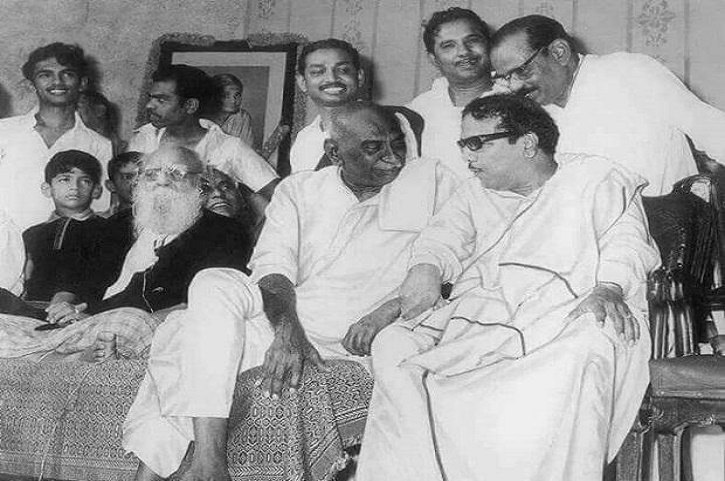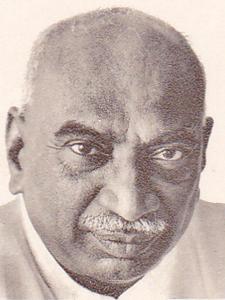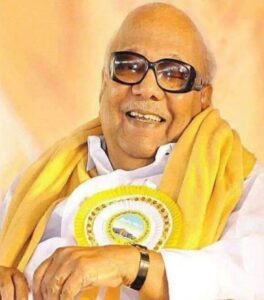Published Jul 18, 2025 | 6:56 PM ⚊ Updated Jul 18, 2025 | 6:56 PM

Periyar, K Kamaraj,and M Karunanidhi. (DMK website)
Synopsis: Though they followed different political ideologies, K Kamaraj and M Karunanidhi respected each other and maintained a relationship that transcended politics.
At the edge of India’s longest beach—the Marina—stands the historic Fort St. George that houses the Tamil Nadu Secretariat. On its walls hang life-size portraits of various iconic leaders. Among them is a portrait of K Kamaraj, under which the words, “‘Uzhaippe Uairvu Tharum’ (Hard work alone contributes to one’s progress) are boldly inscribed.
The words for the inscription came from former chief minister M Karunanidhi. Interestingly, the portrait was unveiled during the tenure of another former chief minister, MG Ramachandran (MGR). It was MGR who sought Karunanidhi’s suggestion for the inscription, a gesture born from the respect the leaders had for Kamaraj.
However, since 15 July 2025—Kamaraj’s birth anniversary—a sharp war of words has erupted between leaders of the Tamil Nadu Congress and the DMK.

K Kamaraj.
Speaking at a public event, DMK Deputy General Secretary and Rajya Sabha MP Tiruchi Siva recalled: “In the 1970s, when Karunanidhi was the chief minister, Kamaraj was travelling across Tamil Nadu for political campaigns. He reportedly suffered from a skin condition that made it difficult for him to sleep in non-air-conditioned rooms. Karunanidhi ordered that AC facilities be arranged in the rooms where Kamaraj stayed.”
While this has been part of Tamil Nadu’s oral political history for years, Siva’s comment unexpectedly sparked a firestorm.
Congress leaders—MPs Jothimani, Manickam Tagore, and TNCC president and MLA K. Selvaperunthagai—lashed out, asserting that Tiruchi Siva had no standing to speak about Kamaraj.
Meanwhile, BJP leaders Nainar Nagendran and K Annamalai joined the fray, accusing the DMK of disrespecting Kamaraj and issuing strong statements on their social media handles.
Amid this row, on 17 July, Chief Minister and DMK president MK Stalin took to X (formerly Twitter), seeking to put an end to the controversy: “Do not give room to the mischief of those who stir up strife under the guise of cooling tempers!
“Periyar revered the great leader Kamaraj as a ‘Pure Tamilian’, he added. “In the Gudiyatham by-election, it was Anna who decided not to field a candidate against Kamaraj. When the great leader passed away, it was Kalaignar who stood like a son, organising the funeral rites, establishing a memorial, and declaring his birth anniversary as ‘Education Development Day’.
Stalin further recalled an ailing Kamaraj gracing his wedding in person. “That remains one of the greatest honours of my life.”
“Debates that tarnish such a towering leader and great Tamilian in public discourse are inappropriate,” the chief minister said. “All remarks must uphold the dignity of such respected figures. Let us unite to fulfill the dreams of a leader who dedicated his life to social justice and secular harmony. Let us avoid futile arguments!”
Following this, on Friday, 18 July, Tamil Nadu Congress president K Selvaperunthagai met Stalin in person and told reporters that the Kamaraj controversy had been resolved.
But this raises a fundamental question: What was the real nature of the relationship between Kamaraj and Karunanidhi? Did Karunanidhi, as the BJP claims, ever treat Kamaraj with disrespect? Only a close reading of political history can offer the answer.
Amidst the ongoing controversy, a video clip from 7 February 1986 resurfaced and is widely circulating on social media.
The video shows former Karunanidhi speaking at a wedding ceremony. Notably, his statement in the video mirrors the very point raised recently by Tiruchi Siva.
In the clip, Karunanidhi says, “During my tenure as chief minister, Kamaraj travelled across Tamil Nadu campaigning against the DMK. Due to the summer heat, his health began to suffer. When I learned that the lodges where he stayed lacked air conditioning, I ordered that AC facilities be arranged for him.”
On 15 July 2013—on Kamaraj’s birth anniversary—Karunanidhi shared a heartfelt tribute on his social media pages. Accompanied by a poem, he penned a long birthday message in Kamaraj’s honour.

M Karunanidhi.
The post began, “Today is the birth anniversary of the great leader Kamaraj! No matter how many ideological or political differences we may have had with departed leaders and eminent figures, we have never forgotten their greatness, noble actions, unparalleled service to the people, sacrifices, and strength. We continue to remember and honour them.”
This message reflected Karunanidhi’s political culture of treating leaders from other parties with grace and respect, transcending ideological lines.
He went on to note, “The honour of erecting the first statue for Kamaraj in Tamil Nadu belongs to the Chennai Corporation, which was under DMK’s control at the time. During critical issues like the Cauvery water dispute and times of national Emergency, I never approached him with the mindset of dealing with an opposition leader. Instead, I saw him as a senior statesman and personally visited his home to seek his opinion before making decisions.”
“It was Kamaraj who inaugurated the Second World Tamil Conference, organized during CN Annadurai’s tenure as chief minister, by delivering the welcome address.”
Karunanidhi further recalled, “Who can forget that during the DMK’s tenure, I lobbied with prime minister Vajpayee and succeeded in having a grand memorial hall constructed for Kamaraj at Kanniyakumari?”
As tokens of gratitude for Kamaraj’s simplicity and public service, Karunanidhi listed several acknowledgements made during DMK rule:
Perhaps most movingly, Karunanidhi recalled a deeply personal moment: “When my mother Anjugam Ammayar passed away on 27 January 1963 at Stanley Medical College Hospital, even before her body reached my home, the then chief minister Kamaraj had already arrived at my house to offer condolences. I hadn’t even reached home yet. That compassionate gesture is something I can never forget.”
“In 2006, Karunanidhi officially declared Kamaraj’s birth anniversary as ‘Education Development Day’, in tribute to his contributions to education.
Kamaraj’s affection was not limited to Karunanidhi alone—he also shared a warm relationship with Stalin.
Despite being in poor health, Kamaraj accepted Karunanidhi’s invitation and presided over Stalin’s wedding.
Recalling the event, Karunanidhi said, “At the time of MK Stalin’s wedding, I invited Kamaraj. Though he initially expressed regret, citing health issues, I made sure the wedding venue was shifted to a location where he could easily attend. We arranged for his vehicle to reach the stage directly, and he stepped onto the dais and blessed the couple. It remains a cherished memory for both me and Stalin.”
Stalin also recalled this memory in his recent tweet.
There have always been deep ideological overlaps between the Dravidian movement and Kamaraj. One prominent example was their shared opposition to C Rajagopalachari’s controversial hereditary education policy. Despite being a senior leader in the Congress, Kamaraj firmly opposed Rajaji’s proposal, much like Periyar, Annadurai, and Karunanidhi.
This alignment led to Periyar extending his support to Kamaraj when he became the chief minister in 1954. Even after the formation of the DMK, Periyar continued to support Kamaraj and held him in high esteem. In 1967, when the DMK won the state elections, Periyar made a notable statement: “I have immense respect for Kamaraj. But I cannot say that about others in the Congress. However, I have respect for all my brothers in the DMK.”
Annadurai, too, held Kamaraj in high regard. After the DMK’s historic win, he reportedly told his party functionaries not to rejoice over the defeat of Kamaraj or C Subramaniam. According to AS Panneerselvan’s biography Karunanidhi: A Life, “Annadurai said the defeat of such senior leaders was a loss for Tamil Nadu as it meant the state would be deprived of experienced representatives in the Union Cabinet.”
Despite being 21 years younger than Kamaraj and despite many sharp exchanges in the legislature and on public platforms, Karunanidhi and Kamaraj shared a relationship of mutual respect. Karunanidhi repeatedly acknowledged Kamaraj’s role in shaping modern Tamil Nadu.
Following the inauguration of the Hyundai manufacturing facility in 1996, Karunanidhi remarked, “It was our Salem resolution that paved the way for accelerated industrial growth in Tamil Nadu. While I, too, praise the leadership of Kamaraj and R Venkataraman for initiating a manufacturing culture, I fail to understand the silence about the DMK’s role in promoting industrialization as a tool for both growth and social transformation.”(Karunanidhi: A Life, AS Panneerselvan)
The book also highlights how the Emergency brought Karunanidhi and Kamaraj closer. Kamaraj admitted to Karunanidhi that both had misjudged Indira Gandhi—Kamaraj for supporting her between 1964–1969, and Karunanidhi between 1969–1972.
He said, “The Emergency has made me appreciate the democratic values upheld by the DMK. Karunanidhi is showing rare courage in defending the essence of a truly free nation: its democratic spirit and its space for dissent.”
Kamaraj lamented the silence of some Supreme Court judges during the Emergency and acknowledged that Murasoli—DMK’s party newspaper—was one of the few outlets defying press censorship. For the first time, his views were featured prominently in Murasoli, decades after its launch in Thiruvarur in 1942.
Deeply disturbed by the Emergency’s excesses, Kamaraj told DMK leaders who approached him for a protest meeting: “I was blind—I saw only compassion in Indira and missed the authoritarian streak that is now threatening not just India’s democracy but the political future of many young nations. Rulers learn dictatorship far quicker than democratic principles.”
On 2 October 1975, Mahatma Gandhi’s birthday, Kamaraj passed away. Initially, Congress leaders decided to hold his funeral at the party grounds in Teynampet. But it was Karunanidhi, the then chief minister, who intervened.
He offered land near Gandhi Mandapam for a state funeral and a memorial, saying, “A great Gandhian has died on Gandhi’s birthday. He will be given a respectful farewell at Gandhi Mandapam.”
Though some felt such a gesture might hurt the government politically, Karunanidhi stood firm.
If Kamaraj and Karunanidhi were alive today, one might say with confidence, they would have issued a joint statement denouncing the current controversy and calling for a dignified remembrance of the past.
(Edited by Majnu Babu).

